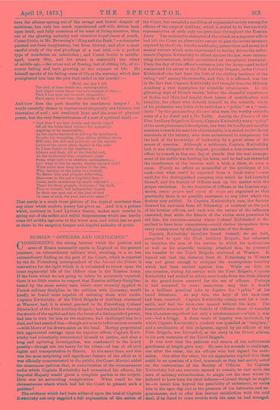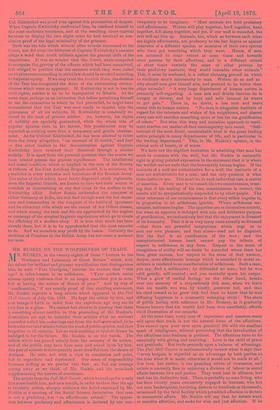areas of Russia necessarily excite in England at the present
juncture, an extraordinary military trial, resulting in a no less extraordinary finding on the part of the Court, which is reported by the St. Petersburg correspondent of the Journal des Dalgais, is instructive for the light which it is calculated to throw upon the inner regimental life of the Officer class in the Russian Army. If the facts which we are going to relate be accurately reported, there is no little reason to suspect that Russian military discipline, tested by the same severe tests which were recently applied to French military discipline io the collision with Germany, would hardly be found more capable of enduring them with credit. Captain Kwitnitzky, of the Third Brigade of Artillery, stationed at Warsaw, had, it is stated. pursued to St. Petersburg Colonel Khlebnikof, of the First Artillery Brigade; had tracked him through the streets of the capital and into the house of a distinguished person, had lain in wait for him on the staircase, had challenged him to a duel, and had assailed him—though not so as to inflict serious wounds —with blows of his drawn sabre on the head. Having perpetrated this aggravated outrage upon his superior officer, Captain Kwit- nitzky had voluntarily surrendered himself to justice, and after a long and agitating investigation, was condemned to the heavy penalty—thoagh not too heavy for his crime—of lose of all civil rights and transportation to Siberia. At the same time, and this was the most surprising and significant feature of the affair as it was officially communicated to the public, theCourt-Martial added the unanimous petition that, in consideration of the circumstances under which Captain Kwitnitzky had committed his offence, his Imperial Majesty would grant a complete pardon to the culprit. Here was an aatounding complication. What could be the ciroutustances which which had led the Court to present such a petition?
The evidence which had been adduced upon the Wolof Captain liwitnitalty not only supplied a full explanation saf the notion of
the Court, but revealed a condition of regimental society among the officers of the corps of Artillery, which is stated to be but too truly representative of evils only too prevalent throughout the Russian Army. The undeniable character of the attack on a superior officer had left the Court no alternative except to pass the severe sentence required by the Code, but the maddening persecution and moral and mental torture which were represented as having driven the unfor- tunate Captain Kwitnitzky to offend against the law, were extenu- ating circumstances, which necessitated an exceptional treatment.
From the day of this officer's entrance into the Army—and he had commenced his career in the First Artillery Brigade, under Colonel Khlebnikof—he had been the butt of the chilling insolence of the ruling "set" among his comrades, and this, it is affirmed, was due to the fact that Captain Kwitnitzky had brought from the Military Academy a rare reputation for scientific attainments. In the
glittering days of French vanity, before the shameful experiences of Sedan and Metz had taught their lesson of mortification and humility, the officer who devoted himself to the scientific study of his profession was liable to be reviled as a " pekin " or a "man- darin " by the gasconading.fidneurs who were the worthy subordi.
mites of a Le Bceuf and a De Failly. Among the ficineurs of the First Artillery Brigade in Russia, Captain Kwitnitzky was a " pekin" of the most pronounced description, nor were his kindly and amiable manners towards his men less objectionable, it is stated, to the showy martinets of the battery, who were accustomed to compensate for the lack of the knowledge of leadership by a great abuse of the means of coercion. Although a nobleman, Captain Kwitnitzky had, it was whispered with disgust, permitted a non-commissioned officer to remark to him one day at parade that the mal-arrange- ment of his saddle was hurting his horse, and he had not rewarded the interference of the veteran with a kick, a blow, or even a curse. Plainly an officer so unmindful of the privileges of his rank—but what could be expected from a book-worm ?—was unfit for the distinguished company into which he had intruded himself, and the Society of Officers took up the matter with the proper resolution. In the Societies of Officers in the Russian regi- ments, amour propre and esprit de corps are organised so that practically there is no possible resistance to any edict which the Society may publish. In Captain Kwitnitzky'e case, the Society decreed his exclusion from all fellowship or courtesy on the part of his brother officers, and such was the nature of the influence exercised, that while the friends of the victim were powerless to aid him, his enemies—among whom Colonel Khlebnikof is de- scribed to have been conspicuous—could shelter themselves from every consequence by alleging the mandate of the Society.
Captain Kwitnitzky therefore found himself, we are told, compelled to quit the First Artillery Brigade, but reluctant to abandon the arm of the service to which his inclinations as well as his scientific training attached him, he procured his transfer to the Third Brigade, stationed at Warsaw. It turned out that the distance from St. Petersburg to Warsaw was not great enough to overpass the unscrupulous hostility which had been excited against him. While on duty on one occasion, during his service with the First Brigade, Captain Kwitnitzky bad wished to obtain some books from the little library in the guard-house reserved for the use of officers. Perhaps it had occurred to some mesa-room wag that it would be a brilliant practical joke to deprive the " pekin " of his loved literature. At any rate, the keys of the book-case bid been removed. Captain Kwitnitzky calmly sent for a lock- smith, and had the book-case opened without the keys. The .honourable members of the Society of Officers chose to consider this blameless expedient not only a misdemeanour—which it was not—but a felmg. A sham court of inquiry was instituted, by which Captain Kwitnitzky's conduct was qualified as " burglary," and a notification of this judgment, signed by six officers of the First Brigade, was forwarded, as the story in the Dibais atiirnas, to his new comrades of the Third Brigade.
It was now that the patience and reason of the unfortusats gentleman at length gave way. He sent his seconds to challenge, one after the other, the -six officers who had signed the accu- sation. One after the other, the six sigeataries replied that these could be no question of a duel, inasmuch as they had merely acted on the instructions of the Society of Officers. To Captain Kwituitzky but one resource seemed to remain, to cant aside the laws of military subordination, single out the man whom he believed to have been his chief defamer—Colonel though lie might be—to insult him beyond the possibility of endurance, lo emits him in the open day and in the presence of his intimates and ac- quaintances, and to offer him instant satisfaction with the cold steel, if be dared to cross swords with the wan he had wronged.
Col. Khlebnikof was proof even against this provocation of despair. When Captain Kwitnitzky confronted him, he confined himself to the moat moderate resistance, and at the resulting court-martial he came to display the two slight scars he had received as con- clusive proof of the legal criminality of the prisoner.
Such was the tale which witness after witness recounted to the Court, nor did even the bitterest of Captain Kwitnitzky's enemies allege a word that could militate against the general drift of the depositions. It was no wonder that the Court, while compelled to recognise the gravity of the offence which had been committed, felt obliged to petition that the sentence which they were called on to pronounce according to strict law should be revoked according to Imperial equity. If we may trust the Invalide Busse, the decision of the Tsar has recognised the force of the extenuating circum- stances which were so apparent. M. Kwitnitzky is not to lose his civil rights, neither is he to be transported to Siberia. At the same time, perhaps as an intimation that before permitting himself to use the extremities to which he had proceeded, he might have remembered that the Tsar was ever ready to inquire into the grievances of all his subjects, M. Kwitnitzky is nominally re- duced to the rank of private soldier. As, however, his rights of nobility are specially guaranteed, while the whole tide of popular opinion runs in his favour, this punishment may be regarded as nothing more than a temporary and gentle chastise- ment. As for Colonel Khlebnikof, he has been allowed to retire from the Army altogether, "on account of ill-health," and four or five other leaders in the demonstration against Captain Kwitnitzky have received their dismissal through a similar malady. It is apart from the personal question that the events we have related possess the gravest significance. The intellectual and moral condition which is implied in the acts of the Society of Officers of the First Artillery Brigade could, it is notorious, be paralleled in other batteries and battalions of the Russian Army. The series of duels which have lately disgraced crack regiments, even the Imperial Guards, are known to have had their source in scandals as demoralising as any that came to the surface in the Kwitnitzky affair. Before Russia undertakes the conquest of either Germany or India, she will find enough work for her states- men and commanders in the conquest of the habits of ignorance and its attendant evils which are the cancer of her Officer classes, and which among the rank and file are aggravated by the neglect or contempt of the simplest hygienic regulations which go to create the efficiency of a modern army. It is true that much has been already done, but it is to be apprehended that the most remains to do. And we ourselves may profit by the lesson. Certainly the abolition of Purchase in the British Army has not come a moment too soon.



































 Previous page
Previous page